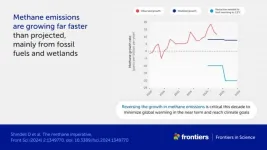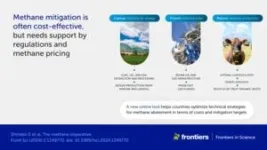(Press-News.org) To control the climate crisis, we must tackle methane emissions now. Methane has contributed about half the global warming we’ve experienced so far, and emissions are climbing rapidly. An international team of climate researchers writing in Frontiers in Science set out three imperatives to cut methane emissions and share a new tool to help us find the most cost-effective ways of doing so.
“The world has been rightly focused on carbon dioxide, which is the largest driver of climate change to date,” said Professor Drew Shindell of Duke University, lead author. “Methane seemed like something we could leave for later, but the world has warmed very rapidly over the past couple of decades, while we’ve failed to reduce our CO2 emissions. So that leaves us more desperate for ways to reduce the rate of warming rapidly, which methane can do.”
Reduce, coordinate, and incentivize
Methane is the second most potent greenhouse gas, but only about 2% of global climate finance goes towards cutting methane emissions. These emissions are also rising fast, due to a combination of emissions from fossil fuel production and increased emissions from wetlands, driven by the climate crisis. To slow the damage from climate change and make it possible to keep global warming below 2°C, we need to act immediately, following the Global Methane Pledge to reduce methane emissions by 30% from their 2020 level by 2030.
The scientists lay out three critical imperatives for action, backed by analyses of satellite remote sensing data, reported methane emissions, and the interaction of abatement options with market forces. Firstly, we need to bring methane emissions down. Secondly, we need to coordinate efforts to tackle methane and carbon dioxide emissions—only cutting carbon dioxide won’t stop warming quickly enough, but only cutting methane just delays global heating. Thirdly, we need to incentivize and enforce methane abatement.
This is a life-saving, cost-effective measure. Estimates indicate that every tonne of methane emitted in 2020 caused US$470-1700 of damages. But this may be a significant underestimate: taking into consideration the effect on air pollution that damages human health, the true cost could be up to $7,000 per tonne—and rising.
“The benefits of methane mitigation nearly always outweigh the net costs,” explained Shindell. “Many methane mitigation options provide net economic gains even without accounting for environmental impacts.”
Methane doesn’t accumulate in the atmosphere in the long term, so emissions reductions take effect more quickly. If we could cut all methane emissions tomorrow, in 30 years more than 90% of accumulated methane—but only around 25% of carbon dioxide—would have left the atmosphere.
“The most important mitigations are the available mitigation options across all sectors that aren’t too expensive, because we really need to do everything to reach climate targets such as 1.5 or 2C warming,” said Shindell. “Controlling methane from only one sector wouldn’t be enough. We need a broad portfolio of actions.”
The right tools for the job
The most impactful opportunities to fight methane will depend on the measures a country has already taken and the industries it relies on. So the authors created an online tool to identify the most effective measures for abatement in different countries. For big fossil fuel producers, regulating production, incentivizing the capture of methane, or charging companies for methane emissions could be the most effective options. For others, focusing on emissions from landfills could offer the biggest rewards. Individuals can help by making lifestyle changes and by thinking about the environment when they vote.
“People can make sure they avoid overconsumption of beef and dairy, and compost their organic waste whenever possible,” said Shindell. “If it’s not possible where they live, they can vote for those who’ll create programs for composting in their towns. They can also vote for those who will make polluters pay for methane emission rather than letting them profit while society picks up the tab for the damages they’re inflicting.”
“There are uncertainties, of course,” cautioned Shindell. “We don’t yet have enough data to fully parse out the contributions of individual factors to the recent surge in the observed growth rate, for example. But it is imperative to rapidly reduce methane emissions to reduce the accelerating climate damages so many people around the world are suffering.”
END
Three-step plan to cut overlooked methane emissions could help us stop global warming faster
Methane, the second most important greenhouse gas, has been neglected—but now scientists lay out a new plan and a new tool to cut emissions down to size
2024-07-30
ELSE PRESS RELEASES FROM THIS DATE:
How researchers turn bacteria into cellulose-producing mini-factories
2024-07-30
Bacteria produce materials that are of interest to humans, such as cellulose, silk and minerals. The advantage of producing bacteria in this way is that it is sustainable, takes place at room temperature and in water. A disadvantage is that the process takes time and gives rise to quantities too small to be of industrial use.
Consequently, researchers have for some time been trying to turn microorganisms into living mini-factories that can produce larger quantities of a desired product more quickly. This requires either targeted intervention in the genome or the cultivation of the most suitable bacterial ...
KERI advances in cathode composite design for sulfide-based all-solid-state batteries
2024-07-30
Researchers in Korea have united to tackle the challenges in the commercialization of all-solid-state batteries. Dr. Yoon-Cheol Ha from the Next Generation Battery Research Center of KERI collaborated with a team led by professor Byung Gon Kim of Department of Applied Chemistry, Kyung Hee University, a team led by professor Janghyuk Moon of School of Energy Systems Engineering, Chung-Ang University, and a team led by professor Seung-kKiSeoung-Ki Lee of School of Materials Science and Engineering, ...
Duke-NUS study reveals peer influence can promote healthier shopping habits
2024-07-30
Singapore, 30 July 2024 — Amid the rise of chronic diseases, such as heart disease and diabetes, a novel study by Duke-NUS Medical School offers a fresh perspective on encouraging healthier grocery shopping. Despite the widespread use of colour-coded front-of-pack nutrition labels aimed to help consumers make healthier choices, these measures have not been sufficient to stem the rising tide of chronic diseases.
To determine if adding behavioural nudges and financial incentives could improve diet quality, researchers from Duke-NUS’ Health Services and Systems Research Programme conducted a randomised trial using an experimental online grocery store called NUSMart.
During ...
Suicide rates among Asian American or Pacific Islander youth sharply increased between 1999-2021
2024-07-30
The results, utilizing National Center for Health Statistics for Asian Americans or Pacific Islander youth ages 10-19 years who died by suicide, were published in the July 25 issue of JAMA Network Open.
The study authors — Brian TaeHyuk, the Buehler Family Sesquicentennial Endowed Assistant Professor at BC’s Lynch School of Education and Human Development; Seungbin Oh, an assistant professor in the Mental Health Counseling and Behavioral Medicine Program at Boston University; and Arielle ...
Published research from the Parkinson’s Foundation shows genetic variants are more common in people with Parkinson’s disease than originally thought
2024-07-30
Published Research from the Parkinson’s Foundation Shows Genetic Variants Are More Common in People with Parkinson’s Disease Than Originally Thought
The PD GENEration study, which tests for clinically relevant Parkinson’s genetic variants and offers genetic counseling, reached a milestone of 15,000 participants in spring 2024 and highlights the importance of sharing genetic data with participants
NEW YORK & MIAMI (July 30, 2024) – New research has found that genetic variants associated with Parkinson’s disease ...
Primary education reforms in Mexico greeted with both enthusiasm and scepticism, study shows
2024-07-30
There has been a mixed response to primary education reforms in Mexico which have created widespread uncertainty among teachers, children and parents, new research shows.
Those affected have expressed concerns about lack of training to help them prepare for the major changes, but also enthusiasm about many of the aims.
The new Nueva Escuela Mexicana (NEM) in Basic Education represents a large shift in curriculum, pedagogy and assessment.
Subjects such as maths and science have been combined into integrated “formative fields”. There is a focus on education that places more value on local communities and an emphasis on active and interactive learning ...
Little evidence to back widespread prescribing of mood-altering drugs to children for mental health issues
2024-07-30
There’s limited evidence to back up the widespread and increasing rates of prescribing mood-altering drugs (psychotropics) as the mainstay of mental health treatment for children and young people, warn experts in an editorial, published today in the August issue of Drug and Therapeutics Bulletin (dtb)
But first and foremost, current prescribing practice for these drugs, which include sedatives, anti-anxiolytics, antidepressants, antipsychotics, and melatonin, needs to be a lot safer, they insist.
The numbers of these ...
Inflammatory activity of rheumatoid arthritis linked to specific cognitive impairments
2024-07-30
The inflammatory activity in the body caused by rheumatoid arthritis is linked to specific cognitive impairments, finds a small comparative study, published in the open access journal RMD Open.
These are diminished visuospatial abilities, recall, abstract thinking, and the executive functions of working memory, concentration, and inhibition.
Inflammatory activity in rheumatoid arthritis has been associated with various systemic effects, including on the brain, but it’s not clear which specific cognitive domains might be affected.
To try and find out, the researchers compared the cognitive ...
Lettuce may be just as good as dock leaf for easing nettle sting symptoms
2024-07-30
Rubbing a lettuce leaf on a nettle sting to ease the associated discomfort may be just as good as using the age-old folk remedy of a dock leaf, suggest the results of a small comparative study, published online in Emergency Medicine Journal.
It may simply be the cooling and soothing effect of sap evaporating from a crushed leaf that brings relief, and doing nothing might work just as well, although possibly not if you’re a small child, suggest the researchers.
Nettles are a common native plant in the British Isles. Their stems and leaves are covered in stinging hairs, or trichomes, with a brittle tip that snaps off when touched, ...
Wayne State University’s new assistant vice president for technology commercialization announced
2024-07-29
DETROIT – Taunya A. Phillips has been named the assistant vice president for Technology Commercialization in the Division of Research & Innovation at Wayne State University.
Phillips will lead revitalization efforts of the technology transfer and commercialization office that includes increasing the protection and commercialization of intellectual property developed at Wayne State, as well as promoting innovation and entrepreneurship efforts in support of the university’s strategic goals and Prosperity Agenda. Her guidance will aid the university’s efforts and commitment to propelling Michigan’s competitiveness in 21st century commerce and cultivating a campus ...
LAST 30 PRESS RELEASES:
1 in 6 Medicare beneficiaries depend on telehealth for key medical care
Maps can encourage home radon testing in the right settings
Exploring the link between hearing loss and cognitive decline
Machine learning tool can predict serious transplant complications months earlier
Prevalence of over-the-counter and prescription medication use in the US
US child mental health care need, unmet needs, and difficulty accessing services
Incidental rotator cuff abnormalities on magnetic resonance imaging
Sensing local fibers in pancreatic tumors, cancer cells ‘choose’ to either grow or tolerate treatment
Barriers to mental health care leave many children behind, new data cautions
Cancer and inflammation: immunologic interplay, translational advances, and clinical strategies
Bioactive polyphenolic compounds and in vitro anti-degenerative property-based pharmacological propensities of some promising germplasms of Amaranthus hypochondriacus L.
AI-powered companionship: PolyU interfaculty scholar harnesses music and empathetic speech in robots to combat loneliness
Antarctica sits above Earth’s strongest “gravity hole.” Now we know how it got that way
Haircare products made with botanicals protects strands, adds shine
Enhanced pulmonary nodule detection and classification using artificial intelligence on LIDC-IDRI data
Using NBA, study finds that pay differences among top performers can erode cooperation
Korea University, Stanford University, and IESGA launch Water Sustainability Index to combat ESG greenwashing
Molecular glue discovery: large scale instead of lucky strike
Insulin resistance predictor highlights cancer connection
Explaining next-generation solar cells
Slippery ions create a smoother path to blue energy
Magnetic resonance imaging opens the door to better treatments for underdiagnosed atypical Parkinsonisms
National poll finds gaps in community preparedness for teen cardiac emergencies
One strategy to block both drug-resistant bacteria and influenza: new broad-spectrum infection prevention approach validated
Survey: 3 in 4 skip physical therapy homework, stunting progress
College students who spend hours on social media are more likely to be lonely – national US study
Evidence behind intermittent fasting for weight loss fails to match hype
How AI tools like DeepSeek are transforming emotional and mental health care of Chinese youth
Study finds link between sugary drinks and anxiety in young people
Scientists show how to predict world’s deadly scorpion hotspots
[Press-News.org] Three-step plan to cut overlooked methane emissions could help us stop global warming fasterMethane, the second most important greenhouse gas, has been neglected—but now scientists lay out a new plan and a new tool to cut emissions down to size





